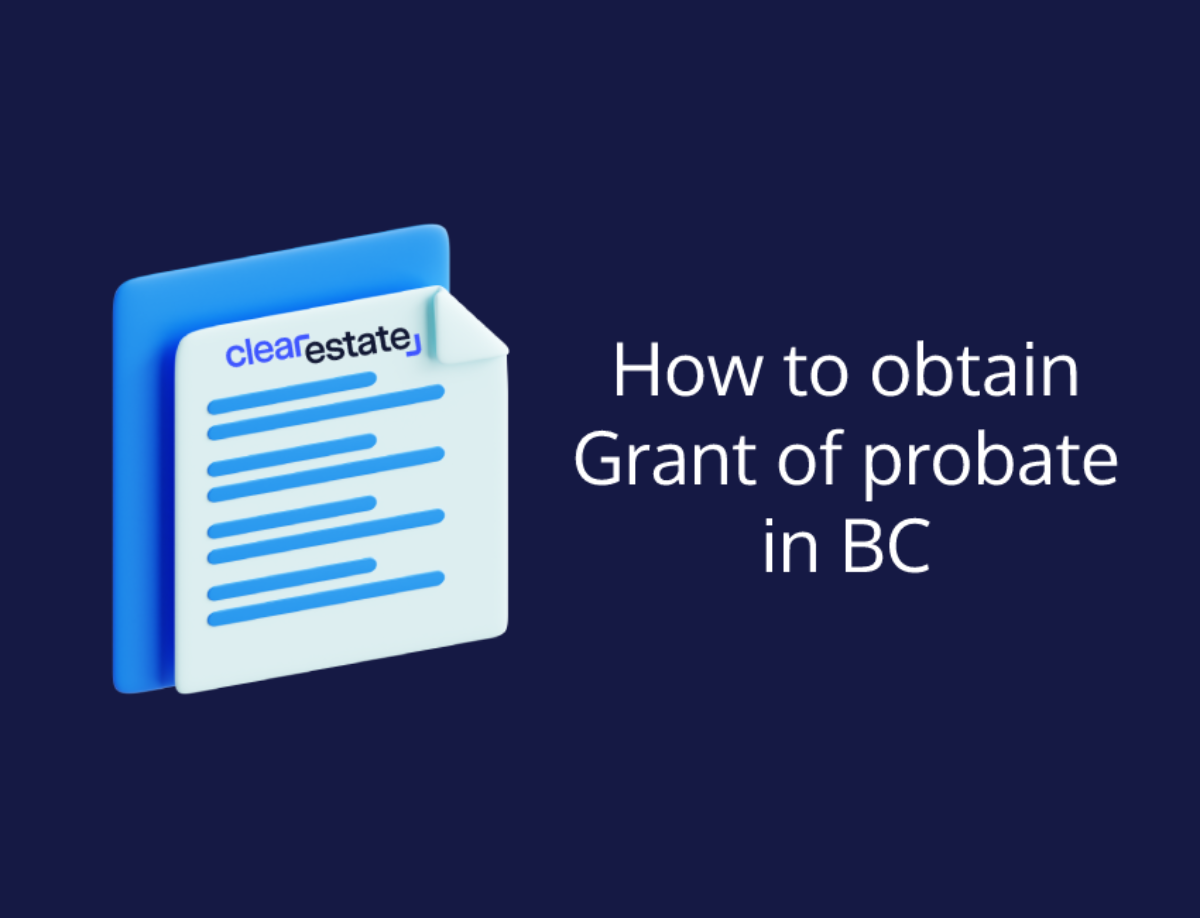Estate Settlement
Dec 04, 2024
How Do Executors Mail Inheritance Checks?
Find out how inheritance checks are mailed, including security measures and what to do if there are delays in receiving them.
The grant of probate is essential for estate executors in BC. Get yours with ease using our guide.


Obtaining a grant of probate is necessary when the deceased passed away with assets solely held in their name. Granted by the British Columbia courts, a grant of probate provides the executor with legal authority to administer the estate.
A grant of probate is typically required by financial institutions, and other organizations holding the assets in question.
Here's a step-by-step guide on how to obtain a Grant of Probate in BC:
To complete the forms, you'll need to have information and documents such as the original will, certified death certificate, a list of assets and liabilities, and the names and addresses of the beneficiaries.
You will need to complete and submit the following probate application forms:
Affidavit of applicant for grant of probate or grant of administration with will annexed (short form) (Form P3)
Affidavit in support of application for estate grant (Form P8)
**Probate Form P8 is only required if there is more than one applicant. (co-executor)
The forms must be filed with the Supreme Court of British Columbia. You can file them electronically or in person at the courthouse.
There is a $200 fee to file each court application. You can check the court's website or contact the court directly for the most up-to-date fee information.
You can also use our handy calculator tool to estimate how much the estate will pay in probate fees: here
A court hearing may be scheduled to consider the application. You will need to attend the hearing and provide evidence supporting your application.
If the court is satisfied with the evidence, it will issue a Grant of Probate. This document provides the authority to transfer ownership of assets in the deceased person's name to the beneficiaries or estate.
The amount of time it actually takes to obtain a grant of probate varies depending on several factors.
Such as:
How busy the court system is
How complex the estate is
If the will is contested
But on average, an executor can expect to receive a grant of probate within a 3-6 month window. However, be prepared to wait even longer - this estate administrator had to wait 9 months until they received their grant of probate.
After obtaining a grant of probate, the real work starts. This is when the executor begins the probate process and administers the estate in accordance with the probate laws of British Columbia and the wishes of the deceased outlined in the will.
In a high-level view, here are some of the main duties an executor carries out while administering the estate:
Informing interested parties: The executor is tasked with keeping beneficiaries named in the will and creditors of the deceased individual informed. This is commonly accomplished by publishing a notice in a local publication and directly communicating with beneficiaries who are difficult to locate through normal means. The notice should contain crucial information about the estate, the executor's contact details, and a deadline for creditors to file claims.
Responsibility for settling debts and taxes: The executor is accountable for paying any debts owed by the deceased individual, including medical bills, funeral expenses, and any unresolved loans or mortgages. The executor is also responsible for the deceased's final tax returns, any missed years of taxes, and any unpaid taxes owed by the estate.
Distributing Estate Assets: After all debts and taxes have been settled, the executor must distribute the remaining assets among the beneficiaries named in the will. This process may involve transferring ownership of personal property, distributing cash or other assets, or transferring real estate.
Final Accounting: Before the estate can be fully administered and closed, the executor must present a final accounting to the beneficiaries, detailing how the estate was managed and how the assets were distributed. This final accounting must be approved by either the beneficiaries or the court before the estate can be officially closed.
Yes, there is a difference between a grant of administration and a grant of probate in British Columbia (BC).
A grant of probate is a court order that confirms the validity of a will and appoints an executor named in the will to carry out the instructions set out in the will.
On the other hand, a grant of administration is a court order that appoints an administrator when there is no will or when the executor named in the will is unable or unwilling to act. The administrator is responsible for distributing the deceased person's assets to the beneficiaries in accordance with the laws of intestacy.
A grant of probate confirms the validity of a will appoints an executor - and gives the executor legal authority to administer the estate, while a grant of administration appoints an administrator when there is no will or when the executor is unable or unwilling to act.
If you need guidance on navigating the probate process in BC, our team of experienced estate professionals are here to help you.
Schedule a free 30-minute consultation with us to learn how we can make the process easy for you.
With decades of expertise and a proven track record of successfully filing hundreds of probate applications each year, we're confident we can help you too. Don't let the probate process overwhelm you, take control and schedule your consultation now. Let us help you obtain your grant of probate with ease.
 Simplify Probate Today
Simplify Probate Today
Get expert guidance from our probate specialists who've helped 10,000+ families.
Book a free consultation today